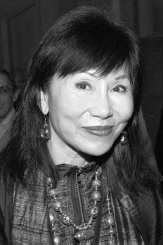Professional Narration Paragraph
Amy Tan
Fish Cheeks

Amy Tan was born in Oakland, California, in 1952, several years after her mother and father emigrated from China. She studied at San Jose City College and later San Jose State University, receiving a B.A. with a double major in English and linguistics, and in 1973, an M.A. in linguistics. In 1989, Tan published her first novel, The Joy Luck Club, which was nominated for the National Book Award and the National Book Critics Circle Award. Tan’s other books include The Kitchen God’s Wife (1991) and Saving Fish from Drowning (2005).
In the following essay, Tan uses narration to describe an experience that taught her an important lesson.
Vocabulary development
prawns: shrimp or shrimp-
appalling: horrifying
clamor: noise
murmured: spoke in low tones
belched: burped
1
I fell in love with the minister’s son the winter I turned fourteen. He was not Chinese, but as white as Mary in the manger. For Christmas I prayed for this blond-
2
When I found out that my parents had invited the minister’s family over for Christmas dinner, I cried. What would Robert think of our shabby Chinese Christmas? What would he think of our noisy Chinese relatives who lacked proper American manners? What terrible disappointment would he feel upon seeing not a roasted turkey and sweet potatoes but Chinese food?
3
On Christmas Eve I saw that my mother had outdone herself in creating a strange menu. She was pulling black veins out of the backs of fleshy prawns. The kitchen was littered with appalling mounds of raw food: A slimy rock cod with bulging eyes that pleaded not to be thrown into a pan of hot oil. Tofu, which looked like stacked wedges of rubbery white sponges. A bowl soaking dried fungus back to life. A plate of squid, their backs crisscrossed with knife markings so they resembled bicycle tires.
4
And then they arrived — the minister’s family and all my relatives in a clamor of doorbells and rumpled Christmas packages. Robert grunted hello, and I pretended he was not worthy of existence.
5
Dinner threw me into despair. My relatives licked the ends of their chopsticks and reached across the table, dipping them into the dozen or so plates of food. Robert and his family waited patiently for platters to be passed to them. My relatives murmured with pleasure when my mother brought out the whole steamed fish. Robert grimaced. Then my father poked his chopsticks just below the fish eye and plucked out the soft meat. “Amy, your favorite,” he said, offering me the tender fish cheek. I wanted to disappear.
6
At the end of the meal my father leaned back and belched loudly, thanking my mother for her fine cooking. “It’s a polite Chinese custom to show you are satisfied,” explained my father to our astonished guests. Robert was looking down at his plate with a reddened face. The minister managed to muster up a quiet burp. I was stunned into silence for the rest of the night.
7
After everyone had gone, my mother said to me, “You want to be the same as American girls on the outside.” She handed me an early gift. It was a miniskirt in beige tweed. “But inside you must always be Chinese. You must be proud you are different. Your only shame is to have shame.”
8
And even though I didn’t agree with her then, I knew that she understood how much I had suffered during the evening’s dinner. It wasn’t until many years later — long after I had gotten over my crush on Robert — that I was able to fully appreciate her lesson and the true purpose behind our particular menu. For Christmas Eve that year, she had chosen all my favorite foods.
Question
What is Tan’s purpose for writing? Does she achieve it?
Question
In your own words, state Tan’s main point.
In your own words, state Tan’s main point.Question
How has Tan organized her essay? List the transitional words and phrases that indicate this order.
How has Tan organized her essay? List the transitional words and phrases that indicate this order.